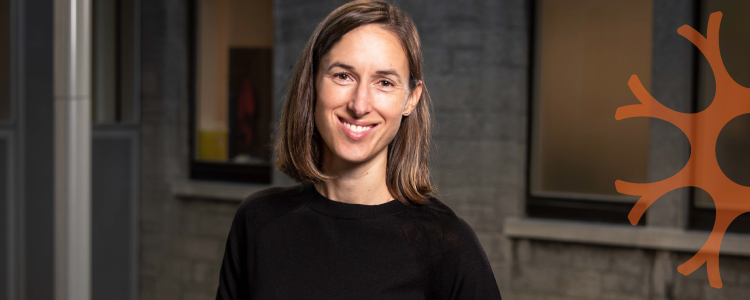

Christine Lucas Tardif, PhD, is an Assistant Professor in the Department of Neurology and Neurosurgery and Department of Biomedical Engineering at McGill University; the Co-Director of the MR Unit at The Neuro's McConnell Brain Imaging Centre (BIC); and Co-Director of the Quebec Bio-Imaging Network (QBIN).
She joined the Azrieli Centre for Autism Research (ACAR) in 2021.
What sparked your interest in working in the field of neurodevelopmental research?
Magnetic resonance imaging (MRI) have reported differences in the way brain networks of autistic individuals are connected and function in comparison to neurotypical subjects.
Interestingly, there are very few quantitative MRI studies that investigate these differences further by mapping the microstructure of the white matter tracts that form these networks.
Given my expertise in MRI, this is the ideal opportunity for me to contribute to larger initiatives in autism research at ACAR and The Neuro.
What are your research goals? What do you hope to achieve at ACAR and The Neuro?
As co-director of the MR Unit at the McConnell Brain Imaging Centre with Prof. David Rudko, one of our goals is to support neuroimaging research in the field of neurodevelopmental disorders at The Neuro. This includes, for example, developing fast and motion-robust imaging protocols for individuals who may find it difficult to remain still during scans, and developing head coils that are adapted to children.
As part of my own research program, I am using advanced MRI techniques to investigate how brain myelination modulates the relationship between structure and function in autism and related neurodevelopmental disorders.
I am also leading the development of the MRI protocol for the Quebec 1000 families (Q1K) initiative, a multi-disciplinary project that brings together several ACAR members are well as other researchers across Quebec.
Learn more about Christine's Q1K research on the Transforming Autism Care Consortium (TACC) website
Biography
Christine Tardif’s lab develops novel MRI techniques to generate high-resolution quantitative MR images of the brain in-vivo, and relates them to microstructural features of the tissue. Methodological developments include novel image acquisition and reconstruction techniques, multi-modal biophysical modelling, and high-resolution cortical modelling. The lab has a translational approach, working on both small animal (7 Tesla) and human (3 and 7 Tesla) MRI systems at the McConnell Brain Imaging Centre.
Tardif’s research has focused on MRI-based investigations of myelin, a lipid-rich cellular membrane that forms an insulating sheath around axons to achieve and maintain the rapid conduction and synchronous timing of neural networks. Myelination is a lifelong dynamic process of forming and modulating myelin sheaths. It underlies key mechanisms of brain plasticity and higher order cognitive functions. In addition to demyelinating diseases such as multiple sclerosis, there is accumulating evidence that dysmyelination contributes to neurodevelopmental and mental health disorders as well. Tardif’s lab investigates myelination (in both white and grey matter) using multiple MRI techniques such as relaxometry, magnetization transfer and diffusion-weighted imaging.
Tardif received her undergraduate degree in computer engineering from McGill in 2004, and her masters’ degree in bioengineering from Imperial College London, UK, in 2006. She then returned to McGill to earn a PhD in biomedical engineering in 2011. After postdoctoral studies at the Max-Planck Institute for Cognitive and Brain Sciences (Leipzig, Germany) and at the Douglas Mental Health University Institute (McGill), she joined McGill in 2017 as an Assistant Professor.
Awards and Recognitions
FRQS Research Scholar - Junior 1 MNI Killam Scholar
Research Areas
Magnetic resonance imaging, ultra-high field MRI, myelin mapping, brain connectivity
List of Selected Publications
Link(s)





